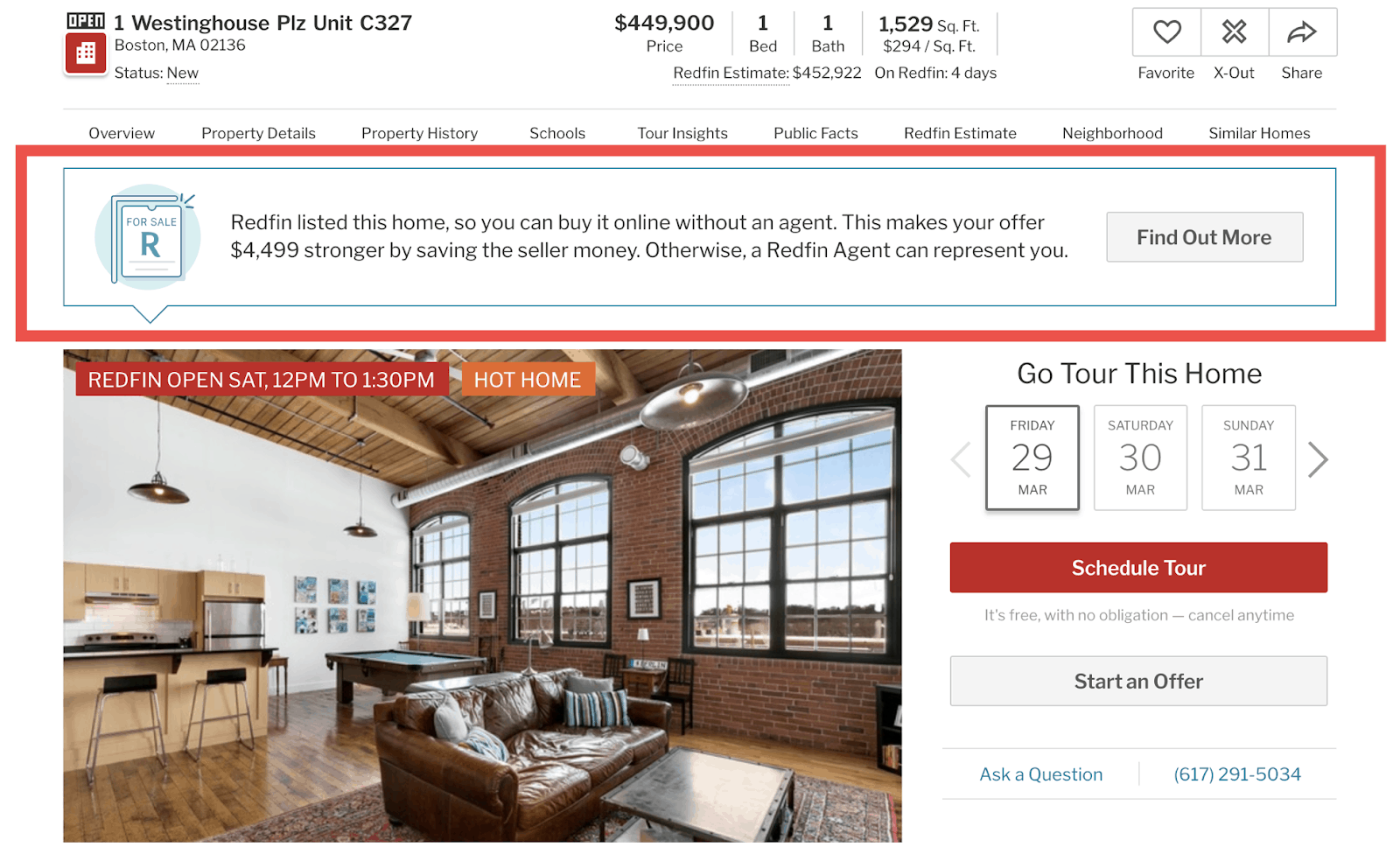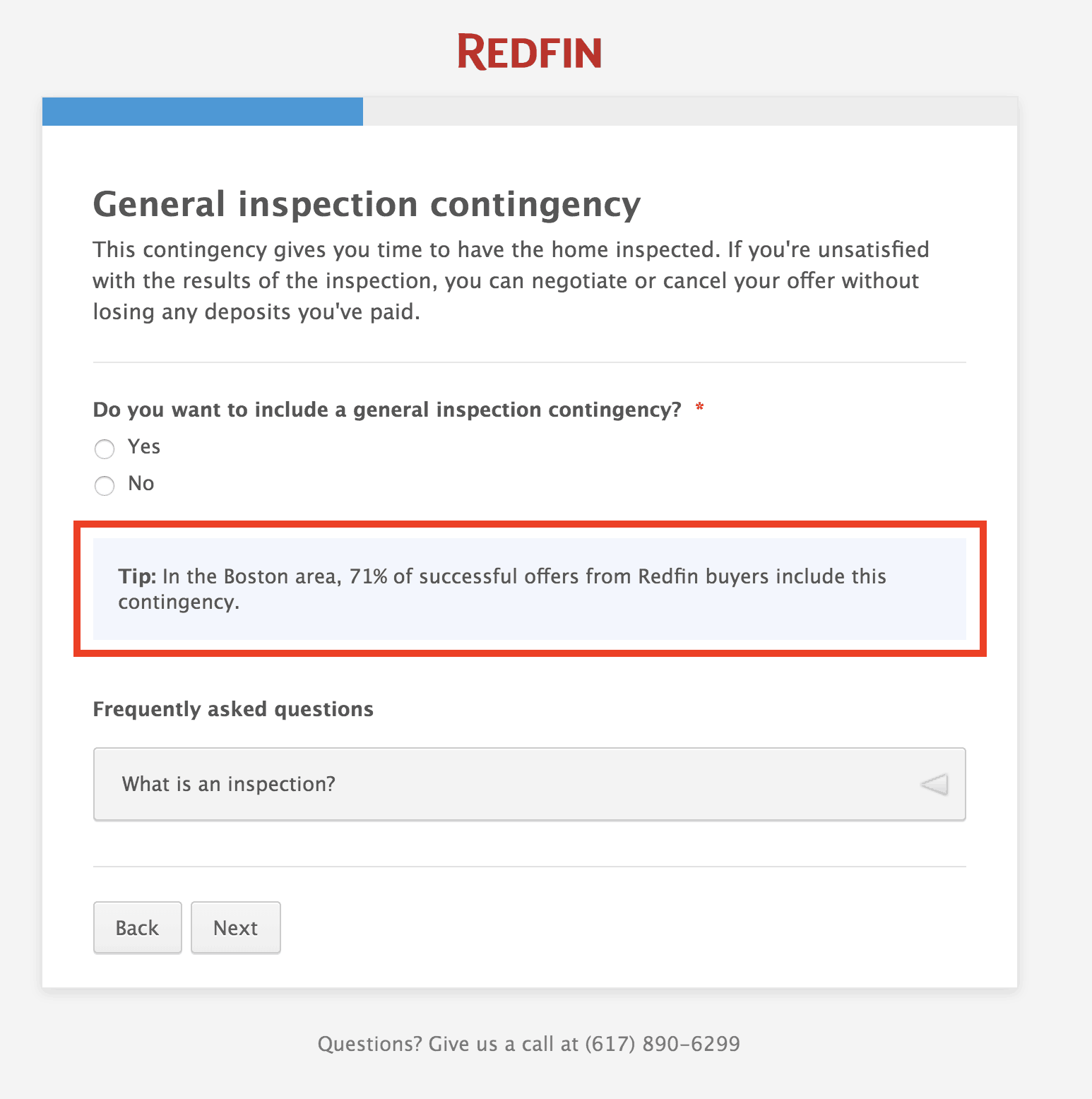On March 28, a real estate reporter in midtown Manhattan asked me over coffee what company was going to be the next great disruptive force in real estate. “It couldn’t be you,” she explained apologetically, “because you have agents.” That same day, Redfin had started a Boston-area pilot of Redfin Direct™, for people to buy Redfin listings through our site without an agent.
We had decided against publicizing Direct until it led to a few sales, but as of today, it has: of the 127 Boston listings that have accepted an offer since March 28, five have been Direct offers. Another 12 of those listings rejected a Direct offer, most of which could easily have won; 77% were within 5% of asking price; 31% were cash offers.
A Total Commission of 2%
Our goal all along was to get more offers for the customers who hired us to sell their homes, and more money in their pockets. We’ve long charged home-sellers in Boston 1% for our own service, and our sellers usually offer an additional 2% to 2.5% for the buyer’s agent. But now, with an offer from an unrepresented buyer, sellers pay an additional 1% to Redfin in lieu of the buyers’ agent fee, for a total commission of 2%.

What Took Us So Long?
Before now, we didn’t have the market presence to make this work. The ability to pair buyers and sellers online depends on listing many homes for sale, and reaching many buyers. We listed 25,000 homes for sale last year. We now promote our listings on a website that reaches 30 million visitors per month.
To attract unrepresented buyers, we first changed the Redfin.com page that shows a Redfin listing, explaining how to make an offer online, and why that offer could be more compelling to the homeowner:

We then developed a 55-question online tool for preparing a Boston offer. This easy, step-by-step guide uses data that only we have, collected from other homebuyers’ offers via the Fast Offers software Redfin built for our agents to generate offer paperwork for our brokerage’s homebuyers:

This data is crucial to making unrepresented offers credible. We can tell an unrepresented buyer that 71% of recent Boston-area Redfin client offers included an inspection contingency, or that 87% included a financing contingency. We know that Boston listings sell on average for 1% less than the listing price.
The software and staff we already have in place to support our brokerage customers made it easier to support Redfin Direct. Our website already lets brokerage customers schedule a tour of any listing online. A network of licensed agents gives brokerage customers on-demand access to homes, even when our employee agents aren’t available. An unrepresented buyer who wants to tour a Redfin listing can now use this same system to access Redfin listings.
Back to the Future
Historians of Redfin may remember that Redfin Direct was also the name of the original service we launched in 2006, which let homebuyers make an offer on any listing, not just the homes Redfin had been hired to sell. These historians will also remember what a disaster this service was: buyers came tramping across the lawns of other brokers’ listings at random times demanding property access, and put together hopelessly off-base offers, all while I re-enacted a bizarre self-destruction ritual each day with the press.
We changed because we realized it wasn’t fair to those brokers, and it didn’t work for our homebuyers, who never seemed to win a bidding war. The problem was that we didn’t get to decide how a home would be toured or bought when it wasn’t listed by Redfin, and we didn’t have the staff to get homebuyers into listings, nor the data to tell them what it would take to win.
Everyone assumed we concluded that this was a terrible idea when in fact it was a great idea, just one that depended on our listing many homes for sale first. In interview after interview, I was asked if I’d learned my lesson, and I always said that I’d learned to be more respectful of other brokerages, but that we still saw ourselves as one of the heroes in a story about how real estate could change. It was just a question of when.
The True Innovators at Redfin: Brokers and Lawyers
Then, last spring, at the tail end of a long meeting, our legal team said it had one more matter to discuss. An unusual number of unrepresented buyers were approaching Redfin’s listing agents, trying to make an offer. It was a sign to me that homebuyers had finally begun to change, but our agents didn’t know what to do.
Our attorneys intervened, saying our duty was to the seller, and that we should take an offer from an unrepresented buyer. Scott Nagel, our president of real estate operations, then reminded me that two of our best field leaders, Paul Reid and Nick Boniakowski, had been campaigning for years to build online tools to get more offers from unrepresented buyers for our sellers.
It was so exciting! It felt like that moment in the movie Inception, when a decrepit Leonardo DiCaprio calls out to an ancient Ken Watanabe, to take a leap of faith, to embrace a radical notion in a half-remembered dream, to destroy the old version of themselves so that they could be young again:
[embedded content]
We had enough homes listed by Redfin agents; we had enough buyers browsing Redfin.com; we had many of the tools. We just needed to build the software for making a credible offer.
Buyers and Sellers Aren’t Confused. The Industry Shouldn’t Be Either.
The results have been better than we hoped. We’d worried that offering a new buying choice could confuse some consumers who barely seem to understand real estate commissions. But our agents report that the people coming to our open houses, many of whom are unrepresented buyers, immediately understand the concept. One Redfin agent said, “Their ears perk up when I talk about Redfin Direct.”
The consumers who stand to gain the most from Redfin Direct are our listing customers, who have often asked over the years if they can ever avoid paying a buyers’ agent. Now in our listing consultations, Redfin’s Boston listing agents are touting Redfin as the one brokerage with a powerful online strategy to do just that. We hope this helps us recruit more listing customers, which in turn leads to more unrepresented buyers making offers via Redfin.com, but it will take us years to expand Redfin Direct to each local market.
The Only Way to Protect Our Agents Is to Innovate for Our Customers
The last remaining question has been about the response from the real estate industry and our own agents. We’ll get the answer to that today, and in the months and years ahead. But we already know the answer because we employ a thousand buyers’ agents ourselves.
Our relationship with our agents isn’t like Uber’s relationship with its drivers; our agents are my colleagues and friends, and many are shareholders in this company and the fiercest advocates for our mission. Our goal isn’t to eliminate these agents. We are these agents.
We don’t want to serve the customers who don’t want service, the homebuyers who hire us grudgingly thinking they have no choice. We want to advise the customers who want advice. Even now, we’re hiring more buyers’ agents, because we believe that most homebuyers want both electronic service and personal service, especially when they’re buying their first home, or buying a home involving plenty of repairs or negotiations.
It’s just that Redfin has another customer to answer to, the person selling a home and paying all the fees. And that person wants us to find new ways to put the most money in her pocket. For any broker, doing this isn’t just an opportunity, but an obligation, as part of our duty to our listing customers.
I’ve thought many times about that journalist in the coffee-shop who said we can’t “disrupt real estate” because we’d have to disrupt ourselves. That mindset didn’t come from her, but from us. It’s the prison our industry has built around itself, that all the ideas for making real estate better have to come from the outside, not the inside. It dooms brokerages to be a victim of change rather than the perpetrator.
The assumption behind almost every conversation we’ve had over the past decade about innovation is that the agents at a company like Redfin merely accede to our mission or accept our innovations, when this idea for Redfin Direct, like so many ideas at Redfin and other brokerages, came from our agents. The people who believe the most in redefining real estate are the ones practicing it. They know better than anyone that the only agent with a bright future is the one who puts the customer first.
This post first appeared on Redfin.com. To see the original, click here.


